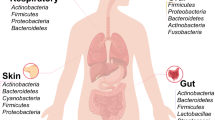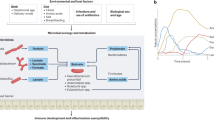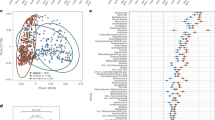Abstract
Objective: To determine the effect of consumption of milk fermented by Lactobacillus casei strain Shirota (L. casei Shirota) on the composition and metabolic activities of the intestinal microflora, and immune parameters in humans.
Subjects: Twenty healthy male subjects aged 40–65 years were selected.
Design:A placebo-controlled trial was performed in which 10 subjects were randomly assigned to a control and 10 to a treatment group. During the first and last two weeks of the 8-week study the subjects received a strictly controlled diet without fermented products. The same controlled diet was given during the intermediate 4-week test period but then the treatment group received three times daily 100 ml of fermented milk containing 109 CFU L. casei Shirota/ml, whereas the same amount of unfermented milk was given to the subjects in the control group.
Results: In comparison to the control group, the consumption of L. casei Shirota-fermented milk resulted in an increase of the Lactobacillus count in the faeces in which the administered L. casei Shirota was predominant at the level of 107 CFU/g wet faeces. This was associated with a significant increase in Bifidobacterium counts (P<0.05). Some shifts in the other bacterial species were found, such as a decreased number of Clostridium; however the differences were not statistically different between the treatment and the control groups.
The β-glucuronidase and β-glucosidase activities per 1010 bacteria decreased significantly (P<0.05) at the second week of the 4-week test period with the consumption of L. casei Shirota-fermented milk. Furthermore, the consumption of the fermented milk product resulted in a slight but significant increase in the moisture content of the faecal samples (P<0.05). No treatment effects were observed for any of the immune parameters measured (including natural killer (NK) cell activity, phagocytosis and cytokine production).
Conclusions: The results suggest that consumption of L. casei Shirota-fermented milk is able to modulate the composition and metabolic activity of the intestinal flora and indicate that L. casei Shirota-fermented milk does not influence the immune system of healthy immunocompetent males.
Sponsorship:The study was financially supported by Yakult Honsha Co. Ltd, Tokyo, Japan.
This is a preview of subscription content, access via your institution
Access options
Subscribe to this journal
Receive 12 print issues and online access
$259.00 per year
only $21.58 per issue
Buy this article
- Purchase on Springer Link
- Instant access to full article PDF
Prices may be subject to local taxes which are calculated during checkout
Similar content being viewed by others
Author information
Authors and Affiliations
Rights and permissions
About this article
Cite this article
Spanhaak, S., Havenaar, R. & Schaafsma, G. The effect of consumption of milk fermented by Lactobacillus casei strain Shirota on the intestinal microflora and immune parameters in humans. Eur J Clin Nutr 52, 899–907 (1998). https://doi.org/10.1038/sj.ejcn.1600663
Received:
Revised:
Accepted:
Published:
Issue Date:
DOI: https://doi.org/10.1038/sj.ejcn.1600663
Keywords
This article is cited by
-
Heat-Killed Lactic Acid Bacteria Inhibit Nitric Oxide Production via Inducible Nitric Oxide Synthase and Cyclooxygenase-2 in RAW 264.7 Cells
Probiotics and Antimicrobial Proteins (2021)
-
Lactobacillus reuteri KT260178 Supplementation Reduced Morbidity of Piglets Through Its Targeted Colonization, Improvement of Cecal Microbiota Profile, and Immune Functions
Probiotics and Antimicrobial Proteins (2020)
-
Functional role of selenium-fortified yogurt against aflatoxin-contaminated nuts in rats
Agriculture & Food Security (2018)
-
Influence of diet on the gut microbiome and implications for human health
Journal of Translational Medicine (2017)



